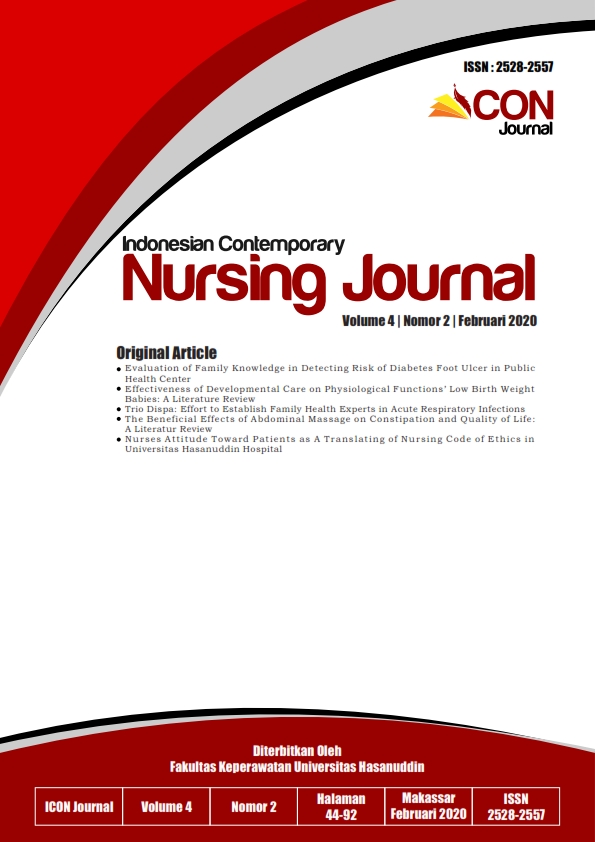The Beneficial Effects of Abdominal Massage on Constipation and Quality of Life: A Literatur Review
DOI:
https://doi.org/10.20956/icon.v4i2.9193Keywords:
Abdominal Massage, ConstipationAbstract
Introduction: The prevalence of constipation has increased significantly as a person ages causing an increase in the incidence of constipation in the elderly can reach 50% and can increase to 74% in patients who are in nursing home. There are a variety of standard interventions used to overcome constipation problems including diet, fluid and physical activity modification. Nursing interventions used to treat constipation are abdominal massage (abdominal massase). The purpose of this review literature is to explain the effectiveness of abdominal massase on constipation and quality of life. Method: The method used to compile the literature review is by searching through an electronic database. Searching for articles is done by using the keywords abdominal massase, constipation, randomized controlled trial, then traced through Scopus, Ebscohost, Sciencedirect, Proquest, Pubmed; 7 articles were selected from the search results, the research design was a randomized controlled trial pre-post test control and group intervention. Results: Based on the article that has been reviewed, abdominal massase intervention has a significant effectiveness in reducing the problems and symptoms of constipation experienced by elderly patients, post-orthopedic surgery patients and patients with multiple sclerosis. Conclusion: Subsequent abdominal massase interventions have also been shown to have an effect on improving the quality of life of patients with constipation.
References
Dadura, E., Stȩpień, P., Iwańska, D., & Wójcik, A. (2017). Effects of abdominal massage on constipation in palliative care patients - A pilot study. Postepy Rehabilitacji, 31(4), 19–34. https://doi.org/10.1515/rehab-2015-0076
Kahraman, B. B., & Ozdemir, L. (2015). The impact of abdominal massage administered to intubated and enterally fed patients on the development of ventilator-associated pneumonia: A randomized controlled study. International Journal of Nursing Studies, 52(2), 519–524. https://doi.org/10.1016/j.ijnurstu.2014.11.001
Lamas, Kristina., Lindholm, Lars., Stenlund, Hans., Engstrom, Birgitta., Jacobsson, Catrine. (2009). Effects of abdominal massage in management of constipation-a randomized controlled trial. International Journal of Nursing Studies 46 (2009) 759–767
McClurg, Doreen., Goodman, Kirsteen., Hagen, Suzanne., Harris,Fional., Treweek,Sean., et al. (2017). Abdominal massage for neurogenic bowel dysfunction in people with multiple sclerosis (AMBER — Abdominal Massage for Bowel Dysfunction Effectiveness Research): study protocol for a randomised controlled trial. Trials (2017) 18:150.Crossmark Open Access
Momenfar, F., Abdi, A., Salari, N., Soroush, A., & Hemmatpour, B. (2018). Studying the effect of abdominal massage on the gastric residual volume in patients hospitalized in intensive care units. Journal of Intensive Care, 6(1), 1–7. https://doi.org/10.1186/s40560-018-0317-5
Turan, Nuray., Astı, Türkinaz Atabek. (2014). The Effect of Abdominal Massage on Constipation and Quality of Life. Gastroenterology Nursing: Volume 39; Number 1; January/February 2016. Society of Gastroenterology Nurses and Associates
Okuyan, Canan Birimoglu., Bilgili, Naile. (2019). Effect Of Abdominal Massage On Constipation And Quality Of Life In Older Adults: A Randomized Controlled Trial. Complementary Therapies in Medicine. https://doi.org/10.1016/j.ctim.2019.102219
Downloads
Published
How to Cite
Issue
Section
License
Authors who publish with this journal agree to the following terms:Authors retain copyright and grant the journal right of first publication with the work simultaneously licensed under a Creative Commons Attribution License that allows others to share the work with an acknowledgement of the work's authorship and initial publication in this journal.
Authors are able to enter into separate, additional contractual arrangements for the non-exclusive distribution of the journal's published version of the work (e.g., post it to an institutional repository or publish it in a book), with an acknowledgement of its initial publication in this journal.
Authors are permitted and encouraged to post their work online (e.g., in institutional repositories or on their website) prior to and during the submission process, as it can lead to productive exchanges, as well as earlier and greater citation of published work (See The Effect of Open Access).
Accepted 2020-03-01
Published 2020-02-29



